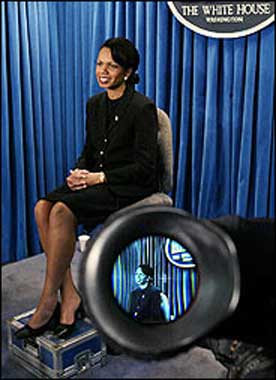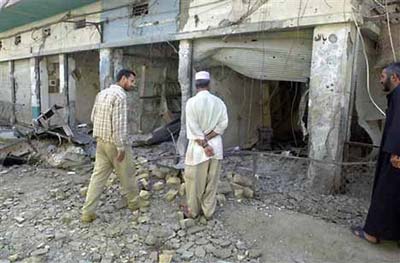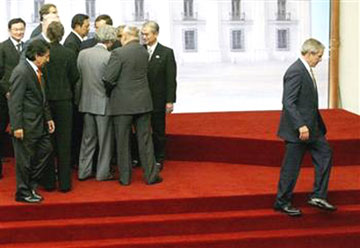Notes
It’s Plain To See What We’re Supposed To See
I was interested in this photo accompanying Sunday’s NYTimes Week in Review article about Condi Rice.

The article (“Hawk Sightings Could Be Premature”) is filled with speculation over what kind of Secretary of State Rice will be and what philosophy she will bring to the job. There are questions about how well she’ll navigate between Cheney and Rumsfeld. There is also the idea that the U.S. –having “maxed out” on hawkishness — might be ready to place a greater emphasis on diplomacy.
While for most commentators, this story is about solving the puzzle of what Rice will do, I think the real story is the puzzle itself.
In other words, to try and clarify Rice’s picture in foreign policy is missing the issue. To get the point of this photograph, you need to appreciate that the focal point is what’s in the lens — not what the lens is pointing at. With her feet on a camera case, for goodness sakes, the answer to what Condi is going to do is to sit in front of the White House curtain, smile, and play the foreign policy prop. The real focus of Rice’s role is not to make or conduct policy as a person unto herself (which is what doomed Powell), but rather to serve as the delivery vehicle for whatever picture the administration (primarily Cheney, Rumsfeld and, ultimately, Bush) decides the public should consume.
There was another excellent example of this kind of “perceptual disconnect” in today’s paper. It’s wasn’t a visual reference, it was a verbal one. And it came straight out of Bush’s mouth.
As you know, the House of Representatives blocked passage of the intelligence bill the other day. Of course, every news report of the story pointed out that Bush and Cheney supported the bill, and that they even called congressional leaders on its behalf. If you think about this scenario a little more deeply however, does it really make sense Bush would have “suffered defeat” on a bill he really wanted passed?
As in the photograph, you have the actual posture of the President (maybe he actually wasn’t supportive of the bill, or not this version of it, anyway), and then you have the picture he wants the American people and the press to focus on.
So, how did Bush’s words provide a snapshot of the contradiction?
Bush was asked about whether opposition to the bill by Donald Rumsfeld (in other words, Administration opposition) contributed to its failure. Bush first said: I was disappointed that the bill didn’t pass.” That sounded pretty straight-forward. But then he added the following phrase: “It was clear that I wanted the bill to passed.”
If it was so obvious he wanted the bill to pass, why was it be necessary to add how clear it was to see?
(photo: Paul J. Richards/Agence France-Presse – Getty Images)


Reactions
Comments Powered by Disqus